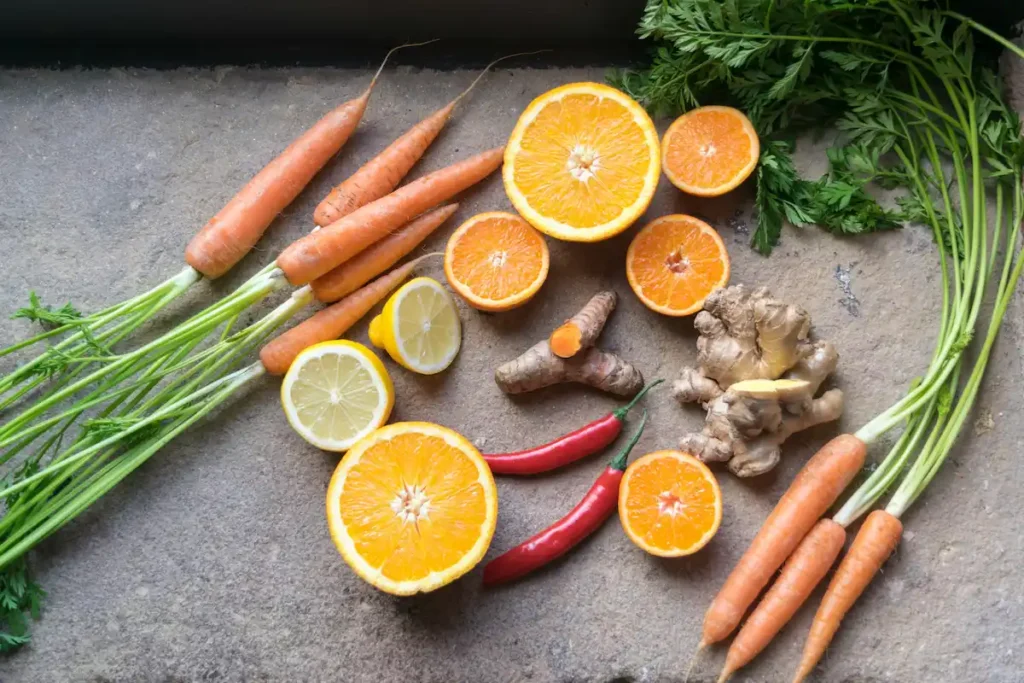Maintaining a healthy smile goes beyond just brushing and flossing—it also involves making mindful choices about what you eat. The foods we consume play a significant role in our dental health, influencing the strength of our teeth, the health of our gums, and the overall condition of our mouths.
Here is a selection of tooth-healthy foods that are essential for promoting optimal dental wellness. From crunchy fruits and vegetables to calcium-rich dairy products and beyond, here are some key ingredients you need to incorporate into your diet for a Hollywood smile and lasting dental health.
Vegetables Good for Teeth
Crunchy Carrots: Carrots are not only packed with vitamins and minerals like vitamin A and potassium, but their crunchy texture also acts as a natural abrasive, helping to scrub away plaque and food particles from the surface of your teeth. Munching on raw carrots can also stimulate saliva production, which helps neutralize acids and protect tooth enamel.
Leafy Greens: Leafy greens such as spinach, kale, and Swiss chard are excellent sources of calcium, which is essential for maintaining strong teeth and bones. They also contain folic acid, a type of B vitamin that promotes healthy gum tissue. Incorporating leafy greens into your diet can help strengthen your teeth and support overall gum health.
Celery: Like carrots, celery is another crunchy vegetable that can help clean your teeth as you chew. It’s also high in water content, which helps dilute sugars and acids in the mouth, reducing the risk of tooth decay. Additionally, chewing celery stimulates saliva production, which washes away food debris and strengthens tooth enamel.
Bell Peppers: Bell peppers are rich in vitamin C, which is crucial for maintaining healthy gums. Vitamin C helps support the production of collagen, a protein that forms the structural foundation of gum tissue. Including bell peppers in your diet can help keep your gums strong and resilient, reducing the risk of gum disease.
Incorporating a variety of colorful vegetables into your meals not only provides essential nutrients for overall health but also contributes to a vibrant smile and strong teeth. Aim to include a rainbow of vegetables in your diet to reap the benefits of their dental health-promoting properties.

Fruits Good for Teeth
Crunchy Apples: Apples are not only delicious but also beneficial for your dental health. Much like carrots and celery, apples have a crunchy texture that helps scrub away plaque and debris from the surface of your teeth. Additionally, apples contain natural sugars, which, although sweet, are less likely to contribute to tooth decay compared to refined sugars found in processed foods.
Strawberries: Strawberries are rich in vitamin C, which is essential for maintaining healthy gums. Like bell peppers, vitamin C supports collagen production, helping to keep gums strong and resilient. Furthermore, strawberries contain malic acid, a natural enamel whitener that can help brighten your smile.
Kiwi: Kiwi is another fruit packed with vitamin C, making it an excellent choice for promoting gum health. Vitamin C helps protect against gum disease by strengthening the gums and supporting tissue repair. Additionally, kiwi is rich in fiber, which can help stimulate saliva production and naturally clean the teeth.
Citrus Fruits in Moderation: While citrus fruits like oranges, lemons, and grapefruits are high in vitamin C, they also contain citric acid, which can erode tooth enamel if consumed in excess. However, when enjoyed in moderation as part of a balanced diet, citrus fruits can provide valuable nutrients for dental health.
Incorporating a variety of fruits into your diet not only adds sweetness and flavor but also provides essential vitamins and minerals for maintaining healthy teeth and gums. Remember to enjoy acidic fruits in moderation and practice good oral hygiene to protect your smile.
Soft Foods for Tooth Pain Relief
When you’re experiencing tooth pain or sensitivity, consuming soft foods can provide relief by minimizing chewing and reducing irritation to sensitive teeth and gums. Here are some gentle and soothing options to consider:
Yogurt: Yogurt is a soft and creamy option that is also rich in calcium and probiotics. Calcium helps strengthen tooth enamel, while probiotics promote a healthy balance of bacteria in the mouth, potentially reducing the risk of dental issues.
Mashed Potatoes: Mashed potatoes are easy to chew and swallow, making them an excellent choice for those experiencing tooth pain. Opt for plain mashed potatoes without added spices or acidic ingredients that could irritate sensitive teeth.
Oatmeal: Oatmeal is a warm and comforting option that can be customized with various toppings like honey, bananas, or berries. It’s soft and easy to eat while still providing essential nutrients like fiber and vitamins.
Smoothies: Smoothies are a versatile option that allows you to incorporate a variety of soft fruits, vegetables, yogurt, and liquids like milk or almond milk. Blend until smooth for a nourishing and easy-to-consume meal or snack.
Soups: Broth-based soups or pureed soups are gentle on the teeth and can be packed with nutritious ingredients like vegetables, beans, and lean protein. Avoid soups with large chunks or crunchy ingredients that may aggravate tooth pain.
Scrambled Eggs: Scrambled eggs are soft and protein-rich, making them an ideal choice for those experiencing tooth sensitivity. Consider adding vegetables or cheese for added flavor and nutrients.
Cottage Cheese: Cottage cheese is soft and creamy, making it easy to eat for individuals with tooth pain. It’s also a good source of protein and calcium, which are essential for dental health.
When consuming soft foods for tooth pain relief, be mindful of avoiding overly hot or cold temperatures, as extreme temperatures can exacerbate tooth sensitivity. Additionally, continue practicing good oral hygiene habits like brushing and flossing gently to promote healing and prevent further discomfort. If tooth pain persists or worsens, be sure to consult with your dentist for proper diagnosis and treatment.
What Food Can You Eat with an Abscessed Tooth?
Many of the soft and gentle foods recommended for toothaches are also suitable for individuals dealing with an abscessed tooth. In addition to mashed potatoes, yogurt, smoothies, soups, and eggs, here are some other options to consider:
Soft Cooked Vegetables: Steamed or boiled vegetables like carrots, squash, and green beans are easy to chew and won’t aggravate the affected area.
Cooked Grains: Soft grains such as rice, quinoa, and couscous provide nourishment without requiring extensive chewing.
Soft Fruits: Bananas, avocados, and ripe melons are gentle on the teeth and suitable for individuals with dental pain.
These soft and gentle foods can provide nourishment while minimizing discomfort for individuals dealing with an abscessed tooth. Be sure to avoid hard, crunchy, or sticky foods that may worsen discomfort or cause further damage to the affected area. Additionally, maintain good oral hygiene practices and follow any treatment recommendations provided by your dentist for proper healing. If you experience severe or persistent symptoms, seek prompt dental care for evaluation and treatment.
Keep Your Mouth Healthy with Monarch Family Dental
At Monarch Family Dental, we’re committed to providing comprehensive dental care for all your needs. However, taking care of your teeth between visits is crucial. By incorporating tooth healthy foods and practicing good oral hygiene habits, you can support your dental health and enjoy a brighter smile. Remember, your dental health is a partnership, and we’re here to help you every step of the way. Contact us today to schedule an appointment and let’s work together to keep your smile healthy and vibrant.


